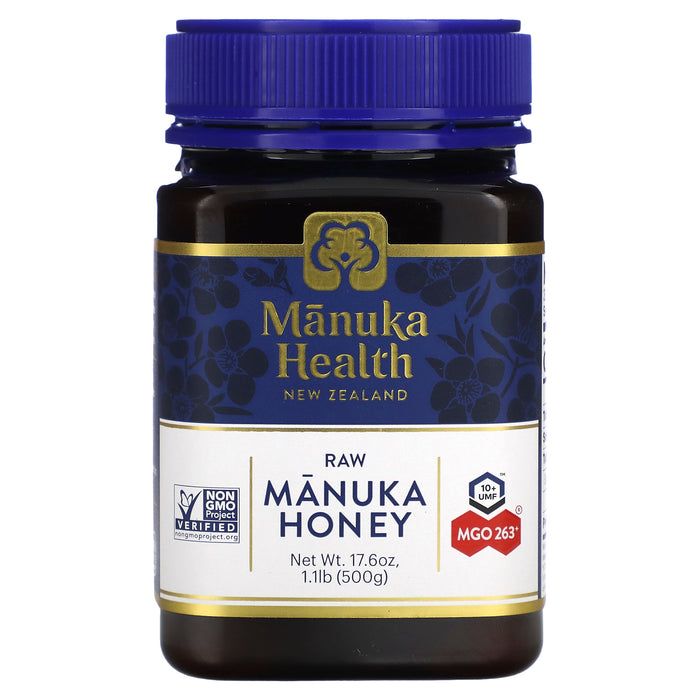




| Serving Size: 1 Tbsp (15 g) | ||
| Servings Per Container: 33 | ||
| Amount Per Serving | % Daily Value | |
| Calories | 45 | |
| Total Fat | 0 g | 0% |
| Sodium
|
0 mg | 0% |
| Total Carb.
|
12 g | 4% |
| Sugars
|
12 g | 24%†
|
| Protein
|
0 g |
|
| Not a significant source of saturated fat, trans fat, cholesterol, dietary fiber, added sugars, vitamin D, calcium, iron and potassium.
%DV* = %Daily Value. †One serving adds 12 g of sugar to your diet and represents 24% of the Daily Value for Added Sugars. | ||
Harness the natural healing power of Manuka Honey by Manuka Health, renowned for its unique properties and health benefits.
Manuka Health's Manuka Honey is a pure, authentic, and delicious monofloral honey from New Zealand. Certified to contain at least 263 mg/kg of natural methylglyoxal (MGO), this raw, unpasteurized, and non-GMO honey is tested for quality, purity, and origin, ensuring a traceable and trustworthy product from beekeeper to jar.
Monofloral MGO 263+ manuka honey.
Not suitable for infants under 12 months of age.
Please store upright below 77°F.
At Health Orchard, we are committed to providing accurate product information and images. However, manufacturers may update their product packaging or ingredients, and these changes may not be immediately reflected on our website. It's possible for products to be shipped with different packaging than what is shown online. For the most accurate and safe use of any product, we advise reading the product's label, warnings, and instructions rather than relying solely on the details provided by Health Orchard.
Manuka honey is renowned for its potent antibacterial properties, which may help fight infections and promote wound healing. It also contains antioxidants that can support overall health by protecting cells from damage, and its natural enzymes may aid in digestion and soothe digestive discomfort.
The best brand of Manuka honey can vary depending on individual preferences and needs. Reputable brands often provide clear information about the honey's origin, UMF (Unique Manuka Factor) rating, and MGO (methylglyoxal) content. These factors can help consumers choose a high-quality product that meets their specific requirements for potency and purity.
Manuka health honey can be used in various ways to support overall well-being. It can be consumed directly by the spoonful, added to warm beverages like tea or lemon water, or used as a natural sweetener in recipes. Some people also apply Manuka honey topically to support skin health or as part of their skincare routine.
While Manuka honey is generally safe for most people, individuals with diabetes should be cautious due to its high sugar content. Those with bee or honey allergies should avoid Manuka honey entirely. Additionally, infants under one year old should not consume any type of honey, including Manuka, due to the risk of botulism.
Consuming Manuka honey daily is generally considered safe for most adults when taken in moderate amounts. Regular consumption may provide ongoing benefits such as supporting immune function and digestive health. However, it's important to be mindful of its calorie and sugar content, especially for those managing their weight or blood sugar levels.
The best time to eat Manuka honey can depend on individual goals and preferences. Some people prefer to consume it in the morning on an empty stomach to potentially enhance its antibacterial effects. Others may find it beneficial to take Manuka honey before bed to support digestive health and promote relaxation. Experimenting with different times can help determine what works best for each individual.